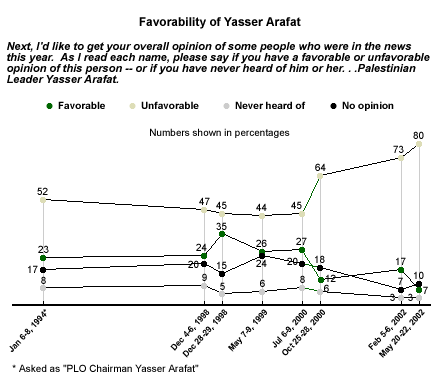Thousands of Palestinians mourned the death of Yasser Arafat, the polarizing president of the Palestinian Authority, as he was laid to rest last week in Ramallah. Although Arafat was considered a beloved leader among Palestinians and other Arabs, there has never been any love lost between Arafat and the American people. Gallup's most recent measurement of Arafat's favorability rating among Americans, taken in May 2002, was 7%, similar to the 9% favorability rating that Cuban President Fidel Castro received in the same poll. Eight in 10 Americans (80%) expressed an unfavorable opinion of Arafat at that time.
Arafat has never been popular with Americans, but his image has not always been as unfavorable as it was in 2002, which marked the most negative reading Gallup obtained on him. In 1993, Arafat signed the historic Oslo peace accord with Israeli Foreign Minister Shimon Peres and Israeli Prime Minister Yitzhak Rabin, which established limited Palestinian self-rule in parts of the West Bank and Gaza Strip. In 1994, Arafat, Peres, and Rabin were jointly awarded the Nobel Peace Prize for the 1993 accord. Nearly a quarter (23%) of Americans had a favorable impression of Arafat in January 1994.

Arafat's favorability among Americans hovered between the mid-20s and mid-30s for the next six years, a period during which Arafat became president of the Palestinian-controlled territories and negotiations continued between Arafat and Israeli leaders.
In October 1998, Arafat and then-Israeli Prime Minister Benjamin Netanyahu signed the Wye River Memorandum, a land-for-peace deal mediated by American President Bill Clinton. Among other things, the deal included a plan to reduce terrorist violence in Israel and an Israeli commitment to withdraw more troops from the West Bank. Two months after this memorandum was signed, in December 1998, Arafat's favorability rating among Americans reached its high point of 35%.
After several months of stalled negotiations, the implementation of the Wye River Memorandum finally began in September 1999. By that point, Arafat's favorability rating had fallen slightly to 26% (according to a May 1999 measurement), but it held steady at 27% in July 2000. However, Arafat and Israel's new prime minister, Ehud Barak, remained deadlocked over the final determination of the borders between Israel and Palestine, the main point of contention being Jerusalem, which contains sites of extreme spiritual importance to both Israelis and Palestinians.
The Intifada
This stalemate and a controversial visit by then-Israeli opposition leader Ariel Sharon to a holy site in Jerusalem led to the Al-Aksa Intifada, a Palestinian uprising manifested in numerous suicide bombings by militants and subsequent attacks in the West Bank by the Israeli military. Once the intifada began in September 2000, Arafat's favorability rating among Americans went from modestly bad to downright terrible.
In October 2000, just 12% of Americans had a favorable impression of Arafat and 64% had an unfavorable impression. By February 2002, Arafat's favorability rating had inched up to 17% -- but his unfavorable rating increased by a larger margin to 73%, as the American public became increasingly familiar with the Palestinian leader.
Violence on both sides continued to escalate during the spring of 2002, leading up to Arafat's lowest rating of 7% favorable, 80% unfavorable in May 2002. Not only did that rank as Arafat's most negative rating, but it also ranks among the highest unfavorable scores of any people rated in Gallup Polls, trailing only Saddam Hussein and Osama bin Laden, both of whom received unfavorable ratings in excess of 90%.
Around this same time, in April 2002, 59% of Americans said they would describe Arafat as "an enemy of the United States," and only 16% said that Arafat genuinely wanted peace with the Israelis (76% said he did not want peace).
Hope for a resolution between Israel and the Palestinian Authority flared briefly in the spring of 2003, when both groups accepted the conditions of a "road map for peace" (proposed by the United States, Russia, the European Union, and the United Nations) and Arafat agreed to hand over part of his power to a Palestinian prime minister. But violence has continued and the Palestinian prime minister post (first held by Mahmoud Abbas, later held by Ahmed Qurei) has wielded little real power.
Bottom Line
How will Arafat ultimately be remembered by the American public? "If an independent state is formed, much of the negative view of Arafat … will be overlooked, and he will be the 'father' of the state of Palestine," says Gordon D. Newby, professor and chair of the Department of Middle Eastern and South Asian Studies at Emory University in Atlanta. "However, if there is not an independent Palestinian state within this next generation, Arafat will certainly be blamed for his failure to move from the role of 'freedom fighter' to statesman and diplomat."
Shibley Telhami, Anwar Sadat Professor for Peace and Development at the University of Maryland, agrees. "He was probably the leader who legitimized the two-state solution" to the Palestinian-Israeli conflict, says Telhami. "But in the end, whether history remembers him well or not will be a function of whether or not there is an Arab-Israeli peace agreement."
